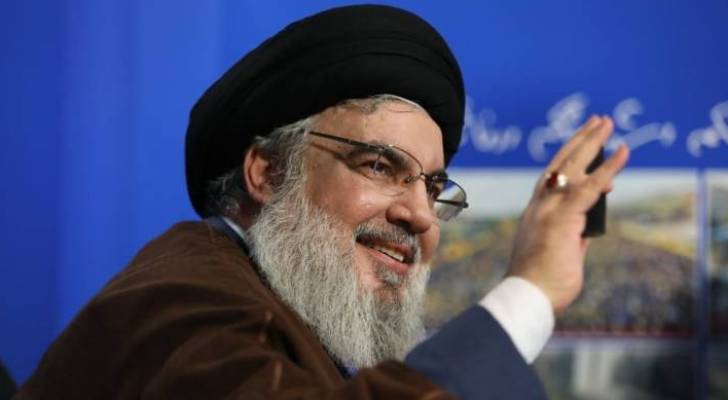Who is Hezbollah leader Hassan Nasrallah?
Hassan Nasrallah, the Secretary-General of Hezbollah, was targeted on Friday in a severe Israeli Occupation airstrike on the southern suburbs of Beirut, specifically in the "security square" of the Haret Hreik area.
Six buildings were completely destroyed, leveling them to the ground. However, according to a source close to the Lebanese Hezbollah, Nasrallah is reported to be "safe."
Nasrallah, who has lived in secrecy for many years due to security concerns, rarely appears in public. Since the 2006 war between Hezbollah and "Israel", Nasrallah has made only a handful of public appearances, one of which was during the 2011 Ashura march in the southern suburbs of Beirut.
In that brief appearance, he addressed thousands of supporters for a few minutes before returning to speak to them through a large screen, where he affirmed that Hezbollah’s resistance would continue to grow in strength.
In an interview with the Lebanese newspaper Al-Akhbar in August 2014, Nasrallah dismissed 'Israeli' rumors that he was isolated in a bunker, disconnected from the world. He explained that while security measures were necessary, they did not prevent him from staying connected with his people and allies.
Nasrallah has occasionally been seen in photos alongside key figures from the "Resistance Axis," which is backed by Iran. He also frequently speaks via video link to large gatherings of his supporters, who chant in unison "Labayka Nasrallah" ("At your service, Nasrallah") during his speeches.
Hezbollah's Secretary-General has built a reputation for being a shrewd leader, deeply knowledgeable in religious and political affairs, and a charismatic orator capable of delivering lengthy speeches without faltering.
Nasrallah took over as Hezbollah’s leader in 1992 following the assassination of his predecessor, Abbas al-Musawi, by 'Israeli' forces. Under Nasrallah’s leadership, Hezbollah has significantly enhanced its military capabilities, with substantial support from Iran. The group now boasts advanced precision weapons that Nasrallah claims can deliver substantial damage to the occupation. He also asserts that Hezbollah's forces number around 100,000 fighters.
Read more: Hezbollah makes first statement following assassination attempt on leader Nasrallah
Beyond its military strength, Hezbollah has established extensive educational, social, and healthcare services, which have solidified the group’s popularity among its supporters in Lebanon.
Hezbollah remains the only faction in Lebanon that retained its weapons after the civil war (1975-1990), citing the need to resist 'Israel'. Its arsenal is said to surpass even that of the Lebanese Army, making it a dominant force in the country. The group is credited with playing a key role in forcing Israeli Occupation’s withdrawal from southern Lebanon in 2000 after nearly 30 years of occupation. This victory further cemented Nasrallah’s standing as a leader among his supporters and throughout the Arab world.
Nasrallah's popularity surged again during the 2006 war with Israeli Occupation, which lasted 33 days. The conflict resulted in the deaths of 1,200 people in Lebanon, mostly civilians, and 160 people in 'Israel', the majority of them soldiers. After the war, Nasrallah declared a "divine victory" in front of tens of thousands of his supporters in Beirut's southern suburbs, which had been heavily damaged by bombings from the occupation.
In the aftermath of the recent conflict that erupted between Hamas and Israeli Occupation on October 7, Nasrallah pledged Hezbollah’s support for Gaza and its ally, Hamas. The confrontation between Hezbollah and 'Israel' has escalated over the past week, particularly as 'Israel' announced a shift in focus from Gaza to its northern front.
In his most recent speech last week, Nasrallah acknowledged that Hezbollah had suffered a "significant blow" after Israeli Occupation Forces destroyed thousands of the group's communication devices.
Nasrallah was born on August 31, 1960, in Beirut’s northern suburb of Bourj Hammoud. He is one of nine children from a modest family originally from the southern village of Bazourieh. He studied religious sciences for three years in the seminaries of Najaf, Iraq, before being expelled in 1978 when Saddam Hussein cracked down on Shiite activists.
Nasrallah became politically active and gained experience in the ranks of the "Lebanese Resistance Regiments" (Amal Movement) before parting ways with the group in 1982 and helping to found Hezbollah. Over time, he ascended the ranks to become the group’s leader.
Hassan Nasrallah is married to Fatima Yassin, and they have five children.




